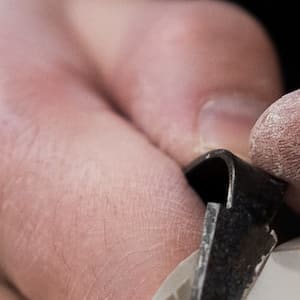feet of clay: Idiom Meaning and Origin
What does ‘feet of clay’ mean?
"Feet of clay" is an idiom that means to have a hidden flaw or weakness, despite appearing strong or admirable on the surface.

Idiom Explorer
The idiom "put a foot wrong" means to make a mistake or to do something incorrectly. It suggests that someone has made an error or misstep in a situation or task.
The idiom "lay something at the feet of" means to hold someone responsible or blame someone for something. It implies the act of attributing a problem or fault to someone else.
The idiom "land on one's feet" means to recover or be successful after a difficult or challenging situation. It suggests being able to adapt and find a positive outcome despite the circumstances.
The idiom "land on one's feet" is a common expression in the English language. When someone "lands on their feet," it means they have successfully overcome a difficult situation or setback and managed to come out of it in a positive or advantageous position.
The idiom "hold someone's feet to the fire" means to put pressure on someone or hold them accountable for their actions or words.
The idiom "hold someone's feet to the fire" is a commonly used expression in American English, often used to convey the idea of holding someone accountable for their actions or promises. It is believed to have originated in the early 17th century but has evolved in meaning over time.
The idiom "heavy-footed" refers to someone who lacks grace and moves clumsily or loudly when walking or dancing.
The idiom "heart of glass" is used to describe someone who is emotionally fragile or sensitive, often referring to someone who is easily hurt or vulnerable.
The idiom "have legs" means that something has the potential to be successful or popular over a long period of time.
The idiom "have legs" is commonly used in English to convey the idea that something has the potential to be successful or popular over a significant period of time. Its origins are unclear, but there are several possible theories that provide insights into its meaning and usage.
The idiom "hard as nails" means to be strong, tough, or unbreakable in character, attitude, or physical strength.
The idiom "foot-in-mouth disease" refers to a situation where someone says something embarrassing or inappropriate without intending to. It implies a lack of tact or social awareness when speaking, often leading to awkward or uncomfortable situations.
The idiom "find one's feet" means to become familiar with a new situation or environment and start to feel confident and comfortable in it.
Mythical Roots
The idiom "feet of clay" is a common expression used in the English language. It has a figurative meaning and is often used to describe a person who appears strong or admirable on the surface but is revealed to have a flaw or weakness. The origin of this phrase can be traced back to a biblical story in the Book of Daniel.
In the story, a king has a dream in which he sees a statue made of gold, silver, bronze, iron, and clay. The different materials represent different kingdoms, with clay symbolizing a weak and crumbling empire. In the dream, a stone destroys the statue, causing it to crumble and scatter like chaff in the wind. This imagery of weakness associated with clay is the basis for the idiom "feet of clay."
The idiom is often used to highlight the idea that even those who seem invincible or morally upright can have hidden flaws. It serves as a cautionary tale, reminding us not to idolize or put too much faith in others, as they may disappoint us.
One related idiom is "at the feet of." This expression is often used to describe someone's position in relation to a person they admire or respect. It implies that the person is figuratively sitting at the feet of the admired individual, learning from them or being influenced by them. It suggests a sense of humility and deference.
Another related idiom is "at one's feet." This phrase is used to indicate someone's complete admiration or devotion to another person. It implies that the person is metaphorically at the feet of the individual they idolize, showing their deep respect and adoration.
Similarly, the phrase "lay something at the feet of" is used to convey the act of attributing or ascribing something to a particular person. It suggests that the person is taking responsibility for an action or outcome and acknowledging their involvement or influence.
There is also the idiom "heavy-footed," which is used to describe someone who is clumsy or awkward in their movements. This phrase is a metaphorical way of saying that the person lacks grace or finesse in their physical actions.
On the other hand, the idiom "cat-footed" is used to describe someone who is light and quiet in their movements. It implies that the person is nimble and able to move silently, similar to the way a cat would.
These related idioms further enhance the understanding and usage of the idiom "feet of clay." They provide additional context and examples of how the concept of weakness, vulnerability, and hidden flaws can be expressed through language.
The phrase "feet of clay" has been in use for centuries and has found its way into various forms of literature. It can be found in the works of authors such as Shakespeare, Dickens, and Melville, adding to its lasting presence in the English language.
Today, the idiom is commonly used in both informal and formal settings. It is frequently employed in discussions of public figures, particularly politicians or celebrities, to emphasize their vulnerability and the potential for their flaws to be exposed.
Furthermore, the idiom serves as a reminder that no one is perfect and that we should approach our judgments of others with caution. It encourages us to see beyond outward appearances and consider the possibility that even the most esteemed individuals may have "feet of clay."
The idiom "feet of clay" originated from a biblical story and has become a well-known expression in the English language. It warns against blindly idolizing others and highlights the potential for hidden weaknesses in those who appear strong or morally upright. This idiom's enduring usage in literature and everyday conversations speaks to its resonance and continued relevance in our society.
Example usage
Examples of how the idiom "feet of clay" can be used in a sentence:
- Despite his successful public image, the politician showed his feet of clay when evidence of corruption surfaced.
- The famous celebrity turned out to have feet of clay as her scandalous secrets were revealed by a tabloid.
- After years of idolizing my favorite author, I was disappointed to discover that she had feet of clay and had plagiarized some of her work.
More "Metaphors" idioms

